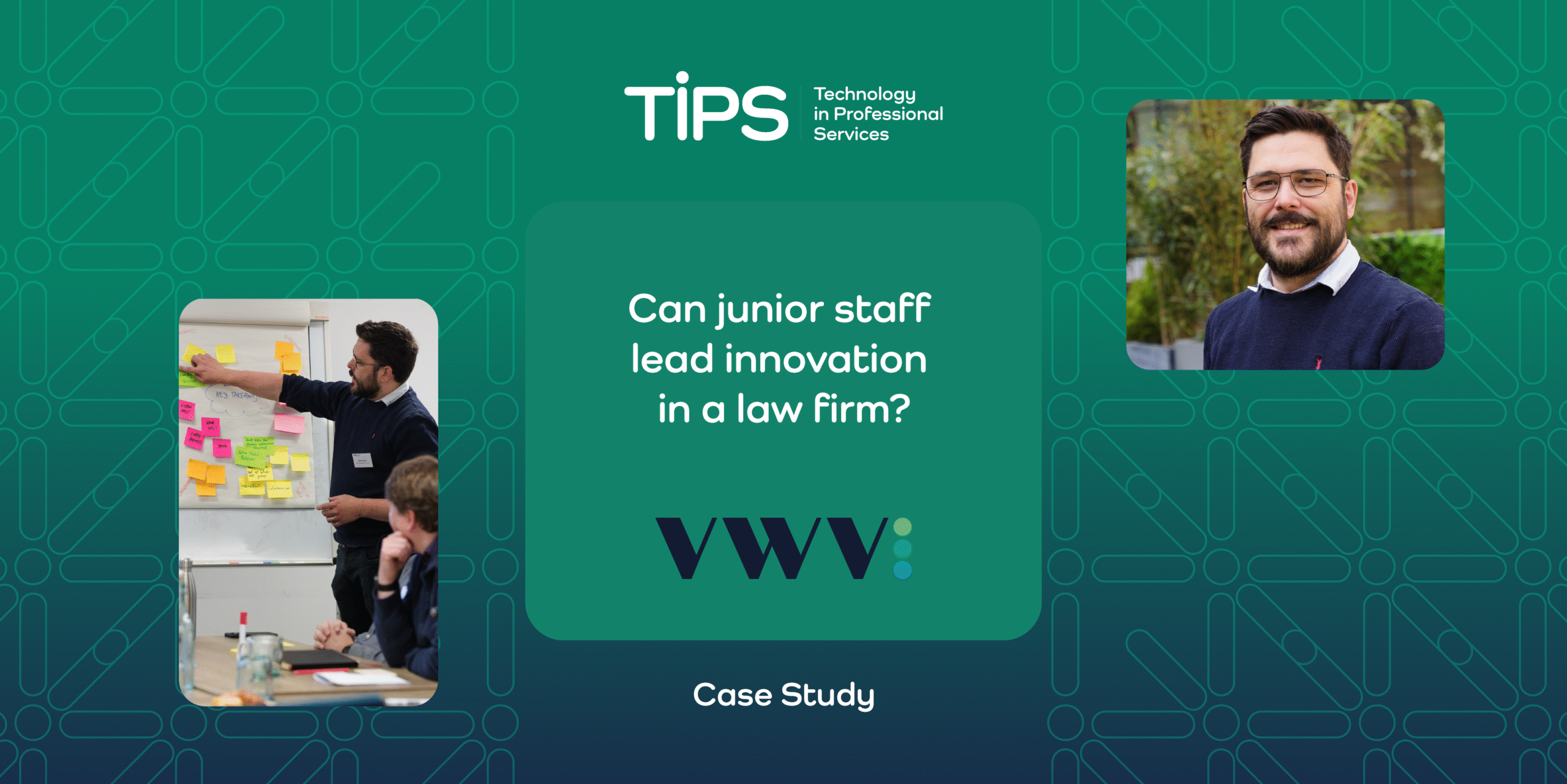VWV are a full-service legal firm with over 500 staff at offices in Bristol, London and Birmingham.
The Challenge: Bridging Innovation and Legal Practice
A key challenge for the firm was fostering a culture of innovation among its trainee solicitors. Recognising that AI has the potential to transform legal workflows, the firm sought to encourage, support, and motivate its trainees to explore AI-driven solutions that could solve common workplace challenges.
A cohort of 26 trainees was tasked with identifying inefficiencies in daily working practices and proposing AI solutions that could improve productivity. A significant challenge identified was the time-consuming nature of producing meeting notes and subsequent document creation, such as attendance notes.
The TiPS Project: AI-Assisted Meeting Report Production
The TiPS adoption project aimed at integrating AI-driven technology into report production. Junior team members, including trainees and paralegals, often spent 1–3 hours processing transcripts into effective summaries and attendance notes following internal and client meetings. Addressing this widespread issue became a priority for the firm.
Through a series of firm-wide workshops, trainees collaborated to identify use cases and priorities for the use of AI-driven report production technologies. It was during these sessions that a trainee proposed piloting Meeting Insights technology, delivered by AudioCodes. This AI-powered solution offered a transformative approach to meeting documentation by generating high-quality transcripts, automated meeting summaries, and AI-assisted drafts for reports, attendance notes and witness statements.
The firm, therefore, began a pilot of Meeting Insights. Trainees used the technology and also worked with other solicitors and partners to develop ways of incorporating its use into a range of different types of meetings. They evaluated the outputs of the technology and ways of improving the accuracy and usefulness of the reports generated. Trainees also developed approaches to reviewing the outputs to ensure the accuracy and appropriateness of the reports.
Trainees found that using an AI meeting assistant to provide a first draft could reduce the time spent on attendance notes by more than half, and they are now able to play a meaningful role in client meetings. Trainees can now focus entirely on client conversations without being preoccupied with transcription.
Firm-wide information sharing has now improved, thanks to the ability to provide better summary reports from meetings, allowing teams to collaborate more effectively.
Lessons learned
Engage & Enhance – VWV were brave and bold, taking a proactive approach by engaging its trainee solicitors in an in-house innovation programme, challenging them to identify and implement AI-driven technologies that address everyday inefficiencies.
This project has emphasised the importance of building a sense of community, a culture that supports experimentation, and the real impact of this approach for developing sustained innovation work within the firm from the bottom up. This AI integration not only provides the firm with a competitive edge but also supports trainees in adapting to the digitalisation of legal knowledge—a crucial step in modernising legal practice.
The group of trainees have also played a crucial role in evaluating the technology. By monitoring use, assessing outputs, identifying limitations and potential solutions, and comparing the chosen technology to alternative solutions, the trainees have allowed VWV to evaluate the impact of the adoption project and future priorities.
Develop – The engagement of trainees with innovation provides VWV with important competitive advantages. It provides them with a group of professionals focused on questions about innovation through technology adoption, the group scanning the horizon as new technologies emerge and considering potential use cases. This will allow VWV to develop future adoption projects as new opportunities emerge.
In addition, the innovation programme focused on trainees is a competitive advantage when recruiting new staff. It demonstrates the firm’s commitment to innovation and the effective use of new technologies. It also demonstrates to clients that the firm is forward-looking and harnessing technology in ways that enhance services. The visibility of innovation and technology adoption helps set the firm apart.
Conclusion
The success of the TiPS Proof of Concept pilot demonstrates how law firms can leverage AI technology while fostering innovation among solicitors. By empowering trainees to identify and implement AI-driven solutions, this firm has set a precedent for embracing technology in legal practice.
Testimonial:
“TiPS was a great way to get things moving on our digital change agenda. A collaborative and valuable forum to get up to speed with the latest methodologies for running a successful change program in our law firm. This was coupled with industry-leading guidance and support.” – Martin Hasler, Innovation Manager

